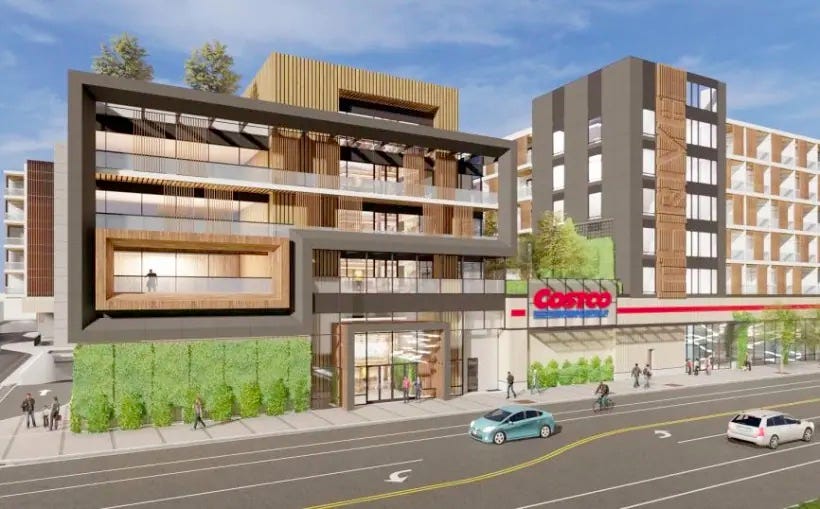Why is Costco building housing over a new store in LA?
Joe Cohen on the regulatory path of least resistance
An amusing story from LA. Joe Cohen on Twitter, June 2024:
Costco wanted to build a store in Central/South LA.
The problem is, new massive big-box stores are hard to get approved in LA. They're subject to discretionary approvals, site plan review, and have to go through CEQA.
Costco was facing years of public hearings, millions of dollars of consultant fees, and an uncertain outcome.
However, mixed-use housing projects that meet certain criteria are automatically exempt from discretionary reviews by state law (AB 2011).
So Costco did what any good Scooby-Doo villain would do. They put on a mask that says “I'm an apartment building, not a big-box store.” (I'm really stretching with this metaphor.)
But now they faced some new problems.
To get the full protection of state housing laws (HAA), mixed-use buildings must be at least 2/3 residential. The Costco itself is 185,000 square feet. So they needed at least 370,000 sq ft of residential.
(They ended up with 471,000 sq ft of residential plus an additional 56,000 sq ft of amenity space)
But for a project that big, to qualify for AB 2011, you need to not only pay prevailing wages, but use “skilled and trained” (aka union) labor.
“luckily”, union labor requirements only apply to on-site construction. So to lower the amount of on-site labor needed, Costco turned to pre-fab building modules.
Pre-fab modules need to fit on trucks, which results in mostly small shotgun-style one-bedroom units.
Costco Gets Creative with Mixed-Use Big Box. Josh Stephens, California Planning and Development Report, July 2024:
The density bonuses, which require 184 of the residential units to be affordable, raise the allowable number of units on the site from 593 to 918. [The plan is for 800 apartments.] It’s an elegant alignment of interests for both parties: Thrive gets a deep-pocketed partner with whom to build housing, and Costco gets to open its doors, stock its shelves, and begin generating revenue without suffering through environmental review and inevitable lawsuits.
Based on TOC guidelines, the project is required to provide at least 1,141 parking spaces, for residential and commercial combined. But, based on AB 2097 – which prevents the city from imposing any parking requirement within a half-mile of a transit stop – that requirement drops to exactly zero. In fact, the developers are choosing to provide 1,515 spaces. This seemingly sensible investment contradicts the worst fears of pro-parking folks: zero parking minimums does not necessarily mean zero parking. Developers may be frugal, but they’re not insane. (Ponder, for a moment, what zero parking would look like at a Costco.)
Does this make much sense? It reminds me of a software kludge - it gets the job done, but you would never sit down and design a system to work this way.
More
Costco wants to build a different kind of store in South L.A. — with bulk housing. Nathan Solis, LA Times, February 2023.
The Costco of housing is … Costco? Jeff Fong, June 2024.
Costco's bold new plan for the California housing crisis. Farley Elliott, SFGate, June 2024. Quotes Joe Cohen: “The planning and land use system in California and in LA is a Rube Goldberg machine, and this project is seeing that machine laid bare.”
New Costco with apartments breaks ground in South LA. Jonathan Lloyd and Michelle Valles, NBC Los Angeles, September 2024.

